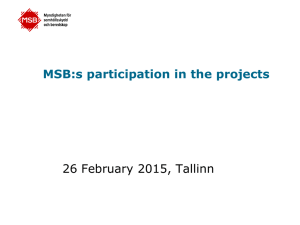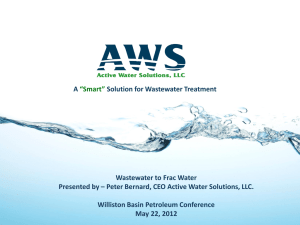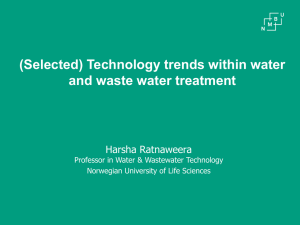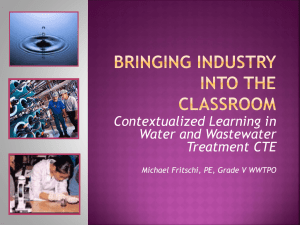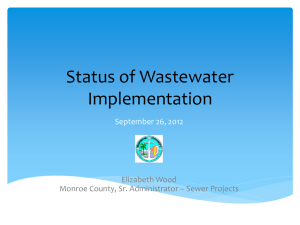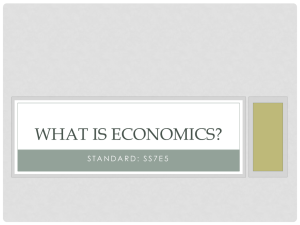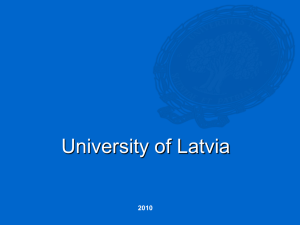The 21 st Baltic Sea Parliamentary Conference
advertisement
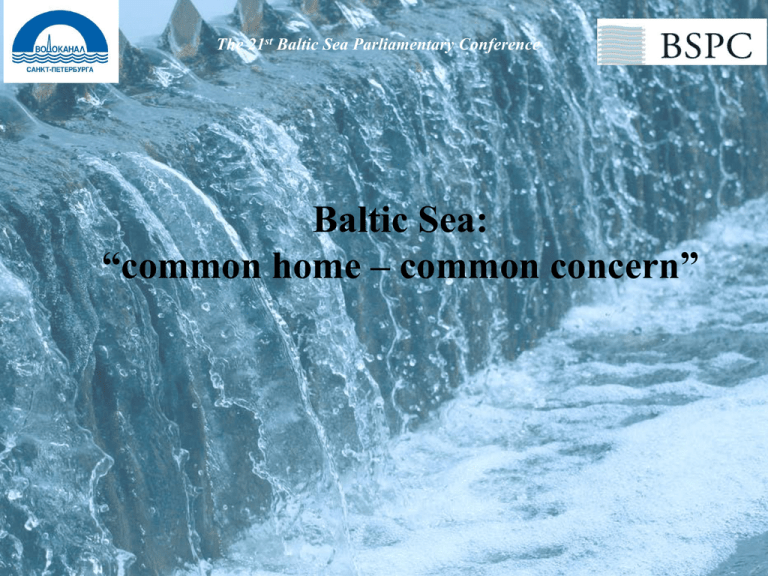
The 21st Baltic Sea Parliamentary Conference Северная станция аэрации Baltic Sea: “common home – common concern” The 21st Baltic Sea Parliamentary Conference The 21st Baltic Sea Parliamentary Conference Wastewater disposal system in St. Petersburg Citizens provided with wastewater services: 97.3 % Zelenogorsk WWTP Molodezhny WWTP Volume of wastewater treated – 2.24 Mio. m3/day Repino WWTP Number of wastewater treatment plants – 14 Sestroretsk WWTP Kronstadt WWTP Northern WWTP The biggest are: •Central WWTP – 1.5 Mio. m3/day •Northern WWTP – 1.25 Mio. m3/day •South-West WWTP – 0.33 Mio. m3/day Volume of treated effluent subject disinfection: Petrodvorets WWTP 19.7 % Central WWTP Length of sewerage networks – 8,270 km Metallostroy WWTP South-West WWTP There was no wastewater treatment in the city before 1978. All wastewater was discharged untreated into the water bodies. Length of tunnel collectors – 232.2 km Pontonny WWTP Kolpino WWTP Pushkin WWTP Number of sludge incineration plants – 3 The 21st Baltic Sea Parliamentary Conference The 21st Baltic Sea Parliamentary Conference Development of wastewater disposal system in St. Petersburg – Main tasks Reduce adverse impact on the environment Provide reliable wastewater services Improve energy efficiency and save energy Provide access to wastewater services The 21st Baltic Sea Parliamentary Conference Baltic Sea: “common home – common concern” Helsinki Commission (HELCOM) is an initiator of the • • environmental policy for the Baltic Sea Region to be implemented by developing of: common environmental targets; activities to meet these targets The Commission comprises Sweden, Denmark, Finland, Lithuania, Latvia, Estonia, Germany, Poland and Russia. Our objective is to treat wastewater in accordance with HELCOM requirements: • • total nitrogen amount in effluent – maximum 10 mg/l total phosphorus amount in effluent - maximum 0,5 mg/l The 21st Baltic Sea Parliamentary Conference “Hot Spots” of the Baltic Sea 132 spots HELCOM countries 18 spots Vodokanal of St.Petersburg Russia 6 spots St.Petersburg Vodokanal of St.Petersburg Vodokanal of St.Petersburg 13 “hot sub-spot” have been eliminated 1 “hot spot” with 19 “hot sub-spots” 4 “hot spots” 4 “hot sub-spots” are expected to be eliminated The 21st Baltic Sea Parliamentary Conference Clean Baltic Sea – Our Common Home Solving the eutrophication problem (pollution of the marine environment with blue-green algae) is one of the major environmental tasks for the Baltic Sea countries. Most European countries apply a well-known chemical tertiary treatment method to ensure enhanced phosphorus removal. John Nurminen Foundation offered its assistance for implementing this technology in St.Petersburg. The 21st Baltic Sea Parliamentary Conference Growth of Wastewater Treatment Volumes 96% Construction of the MTS. Phase 2 SWWWTP Closure of untreated wastewater discharges along the Okhta River and in Petrogradsky district. Commissioning of Molodezhny WWTP Construction of the MTS. Phase 1 NWWTP CWWTP before MTS - main tunnel sewer The 21st Baltic Sea Parliamentary Conference The Northern Landfill The main stages of sludge treatment Geotube method Treatment of the sludge stockpiled at the landfills Treatment of stockpiled wastewater sludge at the Northern landfill Northern Volkhonka-2 As a result of the treatment, the sludge is: dewatered Обезвоживается Stabilized Стабилизируется Deodorized Деодорируется Происходит Heavy metals связывание тяжелых areметаллов bound The 21st Baltic Sea Parliamentary Conference Soils Soils application: Mobile process unit to prepare soils One two-level road interchange requires stabilization by soil on the first technical grade road ( Total volume is 15,000 m3). The 21st Baltic Sea Parliamentary Conference Greenhouse gas emission. Carbon footprint Greenhouse potential СО2 N2O СН4 Ways to reduce greenhouse gas emissions from WWTPs • Development and implementation of energy saving technologies • Development and implementation of technologies based on the use of secondary energy sources The 21st Baltic Sea Parliamentary Conference Compliance with HELCOM Recommendation 28Е/5 “Wastewater Treatment” HELCOM Recommendation 28Е/5 “Wastewater Treatment” St.Petersburg (results of the first half of 2012) BOD5 ≤ 15mg/l or BOD5 = 3,2 mg/l Reduction ≥ 80% Reduction = 97,9% Nitrogentotal ≤ 10 mg/l or Reduction ≥ 70% Phosphorustotal ≤ 0,5mg/l or Reduction ≥ 90% Nitrogentotal = 9,1 mg/l Reduction = 70,4 % Phosphorustot = 0,32 mg/l Reduction = 93,8 % The 21st Baltic Sea Parliamentary Conference The 21st Baltic Sea Parliamentary Conference Untreated Wastewater Discharges Closure Connection of small WWTPs to Northern WWTP Construction of Northern Tunnel Collector Construction of new WWTPs On October 29, 2011, wastewater from 7 wastewater treatment plants in the amount of 3,000 m3/day was connected to the Northern WWTP 1 stage – 2008 : 12 discharges (89,700 m3/day) 2 stage – 2009-2010: 44 discharges (98,800 m3/day) 3 stage – 2011: 5 discharges (29,700 m3/day) 2012: 5 discharges (35,500 m3/day) 2013: construction of the collector along Robespiera Embankment Molodezhny WWTP Capacity – 2,500 m3/day Commissioning -2015 The 21st Baltic Sea Parliamentary Conference Reduction of nutrients load on the water bodies Modernization of biological treatment facilities: • Implementation of the chemical phosphorus removal method at all WWTPs of the city Meeting the nutrients removal norms in accordance with HELCOM requirements; Optimization of the system operation. • «KREAL» «UCT», «JHB» Nutrients load removal growth Since 2011, the phosphorus concentration in the total wastewater discharge does not exceed 0.5 mg/l. The 21st Baltic Sea Parliamentary Conference The Baltic Sea water area as of August 2011 The Gulf of Finland is free from blue-green algae The photo was taken by NASA on order of Swedish Meteorological and Hydrological Institute. It was presented at WWF seminar (Stockholm). The 21st Baltic Sea Parliamentary Conference St.Petersburg wastewater disinfection UV unit at SWTP Implementation of wastewater disinfection systems Внедрение Commissioning 2004систем обеззараживания 2005 2006 Capacity, m3/day сточных вод 2011 Sestroretsk WWTP SWTP Repino WWTP Petrodvorets WWTP 17,000 330,000 10,000 65,000 Disinfection systems implementation plan for Vodokanal’s WWTPs Purpose of wastewater disinfection systems implementation: • • • prevention of bacterial and viral pollution of water bodies; ensuring epidemic safety of water bodies; maintaining stable conditions to meet the purposes of water use. The 21st Baltic Sea Parliamentary Conference Search for a disinfection method alternative to UV UV disinfection method Epidemiological safety of water Search for an alternative method PACS 12 CAVITATION GENERATOR Purposes of searching for alternative disinfection methods: Testing of technologies Technology Principle of technology Status of tests Confirmation of disinfection efficiency Cavitation hydrodynamic reactor Hydrodynamic drag (cavitation effect) Completed No PACS 12 Chemical treatment Finishing stage Yes Lasur М-250 UV + ultrasound Preparation stage No data available Peakwave treatment unit Radiation exposure Suspended Preliminary confirmation Chlorine dioxide Chemical treatment Preparation stage No data available • • Reduction of effluent disinfection cost; Maintaining stable disinfection quality. The 21st Baltic Sea Parliamentary Conference Tertiary wastewater treatment Thin-layer sedimentation Lamellas (St.Petersburg State Transport University, Russia) Microfiltration Drum mesh filter (Hydrotech, Sweden) Filtration Brush-anthracitic filter (ZAO “Company “ECOS”, Russia) The objectives of the tertiary system implementation: 1. Provision of the stable suspended solids content in discharged treated effluents to meet the standards specified 2. Provision of the reduction of pollutants in the undissolved state in discharged treated effluents 3. Provision of the increase in efficiency of discharged effluents disinfection systems. The 21st Baltic Sea Parliamentary Conference Sludge Incineration Plants • Dewatered sludge utilization 100%; • Sludge incineration to ash, the volume is 10 times reduced; SIP at CWWTP – 1997 250 t DS/day. 1,05 MWh • No pathogenic flora and unpleasant odor in the ash; • The content of harmful components in the cleaned flue gas from sludge incineration complies with the EC / RF regulations; • Heat abstracted from flue gases is used for hot water supply and heating; • The generated heat is utilized. Turbogenerators provide an opportunity to produce electricity. SIP at NWWTP – 2007 186t DS/day. 2,5 MWh SIP at SWTP – 2007 88t DS/day • Possibility of industrial application of ash. Total energy consumption of CWWTP, NWWTP and SWTP is 370 mio kWh/y Total energy generation is 10,5 mio kWh/y 1,1 MWh The 21st Baltic Sea Parliamentary Conference Sludge landfills Northern Landfill Volkhonka–2 • • • • Total area – 83.7 ha Operated since 1987 Design capacity – 2.0 mio m3 Amount of stored sludge – 1.99 mio m3 • • • • Total area – 35 ha Operated since 1990 Design capacity – 3.0 mio m3 Amount of stored sludge – 2.9 mio m3 Problem solution: 1. Covering with geosynthetic material 2. Treatment with stabilizing substances КОС Problems arising from landfills operation: 1. 2. 3. 4. Landfill is a potential source of air and ground water pollution (environmental problem); Landfill facilities (sludge beds and lagoons) are filled up to critical levels; Inefficient use of land plots; Odor complains from the population 3. Treatment and storing in geotubes Thank you for your attention!
